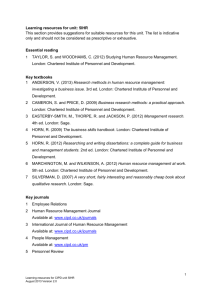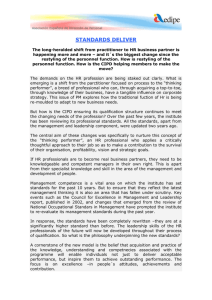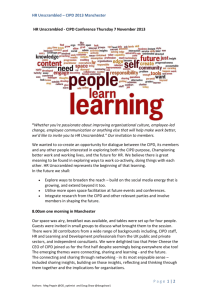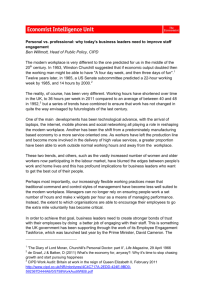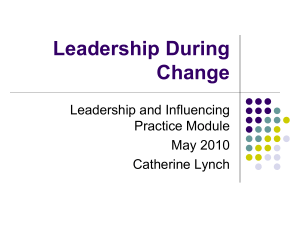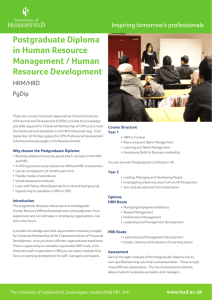MA Human Resource Management Development (Sept 2011)
advertisement
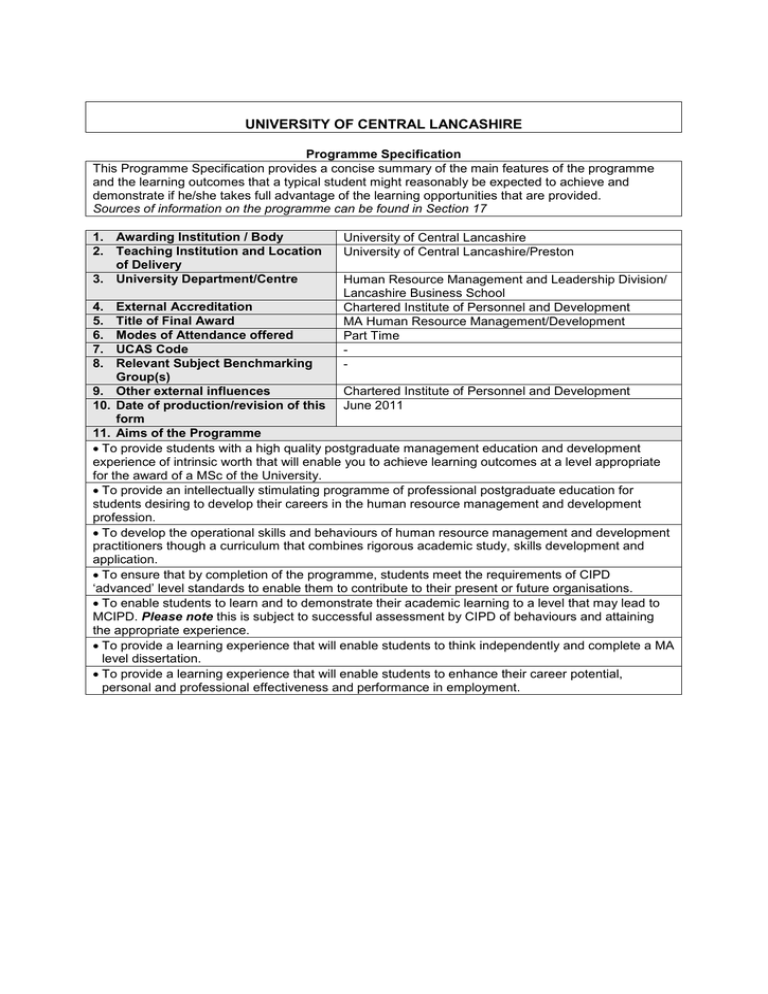
UNIVERSITY OF CENTRAL LANCASHIRE Programme Specification This Programme Specification provides a concise summary of the main features of the programme and the learning outcomes that a typical student might reasonably be expected to achieve and demonstrate if he/she takes full advantage of the learning opportunities that are provided. Sources of information on the programme can be found in Section 17 1. Awarding Institution / Body 2. Teaching Institution and Location of Delivery 3. University Department/Centre 4. 5. 6. 7. 8. University of Central Lancashire University of Central Lancashire/Preston Human Resource Management and Leadership Division/ Lancashire Business School Chartered Institute of Personnel and Development MA Human Resource Management/Development Part Time - External Accreditation Title of Final Award Modes of Attendance offered UCAS Code Relevant Subject Benchmarking Group(s) 9. Other external influences Chartered Institute of Personnel and Development 10. Date of production/revision of this June 2011 form 11. Aims of the Programme To provide students with a high quality postgraduate management education and development experience of intrinsic worth that will enable you to achieve learning outcomes at a level appropriate for the award of a MSc of the University. To provide an intellectually stimulating programme of professional postgraduate education for students desiring to develop their careers in the human resource management and development profession. To develop the operational skills and behaviours of human resource management and development practitioners though a curriculum that combines rigorous academic study, skills development and application. To ensure that by completion of the programme, students meet the requirements of CIPD ‘advanced’ level standards to enable them to contribute to their present or future organisations. To enable students to learn and to demonstrate their academic learning to a level that may lead to MCIPD. Please note this is subject to successful assessment by CIPD of behaviours and attaining the appropriate experience. To provide a learning experience that will enable students to think independently and complete a MA level dissertation. To provide a learning experience that will enable students to enhance their career potential, personal and professional effectiveness and performance in employment. 12. Learning Outcomes, Teaching, Learning and Assessment Methods A. Knowledge and Understanding A1. Critically assess the objectives & methodologies of your business colleagues & stakeholders. A2. Strategically assess trends and patterns and identify good practice which can be imported from outside the organisation. A3 Identify and critically evaluate method and methodological alternatives for undertaking postgraduate research and demonstrate a critical awareness of problems. Teaching and Learning Methods Lectures, small group work and plenary sessions, self-directed study, individual reflection, individual and team presentations, research tasks. Assessment methods Essays, reports B. Subject-specific skills B1. Demonstrate a level of knowledge, understanding and ability about managing people and leadership that meets CIPD Professional Standards. B2. Demonstrate an awareness of the wider contribution that personnel management and development can make to organisational success. B3. Demonstrate an understanding of how to develop organisational capacity through people management and development processes and initiatives that will help to embed or promote change in organisational culture, structure and functioning, and ensure the skills needed to operate in changed roles and environments. Teaching and Learning Methods Lectures, small group work and plenary sessions, practical workshops, critical discussion and evaluation, visiting speakers, individual reflection, and presentations. Assessment methods Essays, reports, presentations, skills assignments, portfolio. C. Thinking Skills C1. Effectively analyse business needs and issues using relevant facts and figures; anticipating objections and preparing responses. C2. Effectively apply a range of critical thinking abilities, tools and processes. C3 Effectively evaluate the appropriateness and potential value of concepts, models, paradigms and ideologies. Teaching and Learning Methods Lectures, small group work and plenary sessions, self-directed study, individual reflection, individual and team presentations, and critical discussions. Assessment methods Essays, presentations, case study analysis. D. Other skills relevant to employability and personal development D1. Demonstrate the ability to prioritise tasks and work schedules D2. Systematically seek to improve performance and professional development through periodic reflection. D3. Identify how to gain support and commitment from others and be able to influence and persuade them. D4. Promote professionalism & an ethical approach to HRM/HRD practice in organisations. Teaching and Learning Methods Lectures, small group work and plenary sessions, self-directed study, individual reflection, individual and team presentations, research tasks. Assessment methods Reports, essays and presentations. 13. Programme Structures* Level Module Module Title Code HR4065 Research Methods Level 7 HR4998 Dissertation 14. Awards and Credits* Credit rating 10 50 ALL THE MODULES BELOW FORM PART OF UCLAN’S ADVANCED CIPD PROGRAMME AND YOU MAY HAVE ALTERNATIVE CREDITS FROM AN EQUIVALENT CIPD COURSE FROM AN AWARDED OR APPROVED CENTRE. MA HRM Requires 180 credits at Level 6 or above with at least 140 at Level 7 and HR4998 dissertation must be on an HRM topic MA HRD Requires 180 credits at Level 6 or above with at least 140 at Level 7 and HR4998 dissertation must be on an HRD topic 4 Core Modules HR4007 HRM in context 15 HR4008 Managing, Leading and Developing People 15 HR4009 Developing Skills for Business Leadership 15 HR4010 Investigating a Business Issue Students will normally have entered from a CIPD accredited Postgraduate Diploma. 15 Option modules HR4011 Organisational Design and Development HR4012 Talent and People Resourcing HR4013 HR4014 HR4015 HR4016 HR4017 HR4018 15 15 Managing Employee Relations 15 Employment Law 15 Performance Management 15 Reward Management 15 Employee Engagement 15 Learning & Talent Development 15 HR4019 Leadership & Management Development Designing, Delivering & Evaluating Learning & Development Provision 15 HR4020 Understanding and Implementing Coaching and Mentoring 15 HR4021 HR4022 Knowledge Management & Organisational Learning 15 15 15. Personal Development Planning As all the students will be familiar with the CIPDs approach, and those students who are members of the CIPD will be required as part of their membership to follow the CIPD route on this course Personal Development Plans (PDP) will take the form recognised by the CIPD which is known as Continuing Professional Development (CPD). Throughout the programme heavy emphasis is placed on relating experiential learning to theoretical concepts and developing this as an ongoing reflexive practice. This also forms part of the assessment of the Dissertation. Students are expected to utilise the CIPD’s resources on the CIPD website; personal tutor/CPD support sessions; teaching/learning/assessment strategies and to maintain their CPD Log. A more detailed account is available in the Course Handbook Appendix 5. 16. Admissions criteria Programme Specifications include minimum entry requirements, including academic qualifications, together with appropriate experience and skills required for entry to study. These criteria may be expressed as a range rather than a specific grade. Amendments to entry requirements may have been made after these documents were published and you should consult the University’s website for the most up to date information. Students will be informed of their personal minimum entry criteria in their offer letter. MA Entry requirements: Students will have 120 credits from UCLAN’s CIPD accredited Postgraduate Diploma A CIPD accredited Postgraduate Diploma Or a qualification deemed by the CIPD to be Postgraduate resulting in Associate, Chartered Membership or Fellowship of CIPD Students would normally be employed within an HR environment or as a manager and are likely to be a Chartered Member of the CIPD. For students where English is not their first language in addition a score of at least 6.5 on IELTS or a score of 600-650 in TOEFL, supported by a pass in the associated Test of Written English, or a score greater than 250 on the TOEFL computer based test. 17. Key sources of information about the programme School of Management Part Time Postgraduate Brochure and website UCLan Postgraduate Prospectus and website CIPD web pages and post code search system Fact sheet 18. Curriculum Skills Map Please tick in the relevant boxes where individual Programme Learning Outcomes are being assessed Level Module Code HR4007 Programme Learning Outcomes Knowledge and understanding A1 A2 C A3 Subject-specific Skills Thinking Skills B1 B2 B3 C1 C2 C3 Other skills relevant to employability and personal development D1 D2 D3 HRM in Context Managing Leading & Developing People Developing Skills for Business Leaders C C Investigating a Business Issue Organisational Design and Development C O HR4013 Talent Management and Resourcing O Managing Employee Relations O HR4014 O O Reward Management O Employee Engagement O HR4008 HR4009 HR4010 HR4011 HR4012 LEVEL 7 Module Title Core (C), Compulsory (COMP) or Option (O) HR4015 HR4016 HR4017 Employment Law Performance Management O Learning & Talent Development HR4019 Leadership & Management O Development HR4020 Designing, Delivering & Evaluating O Learning & Development Provision HR4021 Understanding and Implementing O Coaching and Mentoring HR4022 Knowledge Management & O Organisational Learning All the modules listed above form part of UCLan’s CIPD Advanced level qualification and you may have achieved equivalent credits from another CIPD approved or awarded centre. HR4018 HR4065 HR4998 Research Methods C Dissertation C D4
